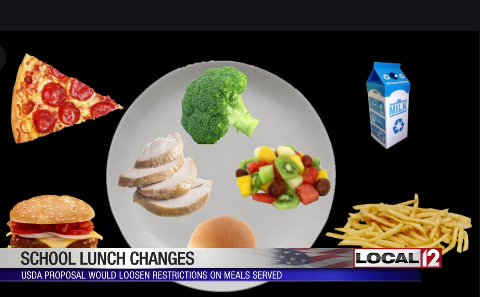[COVID-19\School Meals]
Attorney General James. “As the country grapples with the economic and health impacts of the COVID-19 pandemic, the federal government should not be taking action to undermine key health benefits for our children.”
Photo: YouTube
Attorney General Letitia James led a multistate coalition of 20 attorneys general in pushing back against the U.S. Department of Agriculture’s (USDA) proposed rollbacks of nutrition standards for school meals.
In comments filed with the Trump USDA, the coalition argues that the proposed rule would substantially weaken existing standards for the school meals that tens of millions of children rely on every day, including 1.6 million children in New York alone, and lacks any sound basis in nutrition science.
“The Trump Administration’s illegal move to deny access to healthy school meals ignores the health and wellbeing of over a million children in New York,” said Attorney General James. “As the country grapples with the economic and health impacts of the COVID-19 pandemic, the federal government should not be taking action to undermine key health benefits for our children, particularly those who depend on school meals as their primary source of nutrition. I will continue the fight to ensure that balanced, nutritional meals are accessible to our youngest New Yorkers.”
In 2012, the USDA adopted healthier nutrition standards for school meals. According to the USDA’s own research, these standards have demonstrably improved the nutritional quality of the school breakfasts and lunches on which so many children in this country rely. Unfortunately, the proposed rule would significantly weaken these standards. Specifically, the coalition opposes the USDA proposals to:
- Reduce the required minimum weekly servings of the “red/orange” and “other” vegetable groups in school lunches, such as tomatoes and carrots;
- Cut in half the minimum daily requirements of fruit servings in school breakfasts served in settings other than cafeterias;
- Eliminate the prohibition on synthetic trans fats in school meals without assurance that they have been prohibited in the U.S. food supply;
- Allow smaller school districts, in effect, to serve their youngest students meals with calorie and sodium levels appropriate only for older students; and
- Allow schools to offer students flavored water that contains artificial, calorie-free sweeteners and other artificial additives which might undercut important milk consumption by students.
Established in 1946, the National School Lunch Program is a federally-subsidized program that provides students with healthy, balanced meals in schools at low- or no-cost. In 1966, the School Breakfast Program was added. Since that time, Congress has taken action to ensure that program’s nutritional guidelines keep current with the best scientific evidence, with the most recent modernization occurring in 2010 with the passage of the Healthy, Hunger-Free Kids Act, which led to the 2012 USDA regulations.
In 2019, almost 30 million children consumed nearly five billion school lunches and more than 14 million children ate school breakfasts under the national school lunch and breakfast programs, with over 1.6 million children participating in New York alone. School meal programs are especially important for children in low-income families; in 2019, more than 74 percent of school lunches and 85 percent of school breakfasts provided to schoolchildren in the United States were offered for free or at a reduced price. That number is likely to increase as a result of the contraction of the U.S. economy due to the COVID-19 pandemic, meaning that even more children will depend on school meals as their primary source of nutrition. Further, according to USDA’s own figures, a disproportionately high share of students participating in the national school lunch and breakfast programs are black or Hispanic.
The comment letter follows a multistate lawsuit led by Attorney General James filed in April 2019 against the USDA for illegally weakening federal sodium limits and whole grain requirements for school meals. The suit charges that the USDA lowered the nutrition requirements providing neither a legally-mandated scientific basis for the change nor required public notice and opportunity to comment. The lawsuit was filed in the US District Court for the Southern District of New York (SDNY). USDA later moved to dismiss the lawsuit on standing grounds, but on April 16, 2020, the court denied USDA’s motion to dismiss, finding that the plaintiff states had established their standing and that their challenge to USDA’s sodium and whole grain rollbacks could proceed.
Joining Attorney General James in the comment letter are the attorneys general of California, Connecticut, Delaware, Illinois, Iowa, Maine, Massachusetts, Maryland, Michigan, Minnesota, New Mexico, North Carolina, Oregon, Pennsylvania, Rhode Island, Virginia, Vermont, Wisconsin, and the District of Columbia. This matter is being handled by the Environmental Protection Bureau of the New York Attorney General’s Office and is led by Deputy Bureau Chief Monica Wagner, Assistant Attorneys General Samantha Liskow and Max Shterngel, and Chief Scientist Jodi Feld, in consultation with Environmental Protection Bureau Chief Lemuel Srolovic, and under the Supervision of Chief Counsel for Federal Initiatives Matthew Colangelo and First Deputy Attorney General Jennifer Levy.
To read this press release in Spanish log on here https://ag.ny.gov/press-release/2020/attorney-general-james-fights-protect-child-nutrition?lang=es








